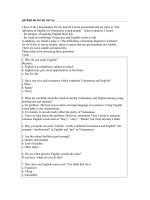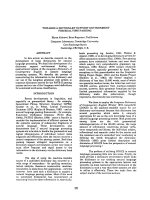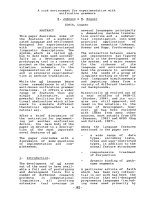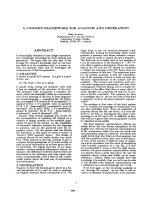RUNNING FOR MY LI FE potx
Bạn đang xem bản rút gọn của tài liệu. Xem và tải ngay bản đầy đủ của tài liệu tại đây (1.93 MB, 297 trang )
R
UNNINGRUNNING
FOR MY
LIFE
My Journe y in the Ga me of
Foo tb all and Be y o nd
WARRICK DUNN
and Don Yaeger
To my mom, who sacrifi ced her life to provide for my broth-
ers and sisters; my grandmother, who stepped up and put
her life on hold to raise us when my mom died; my broth-
ers and sisters, who stuck together in tough times, support-
ing each other; my pops, Maelen “Choo Choo” Brooks, who
helped me to become a man; and to the great people of
Baton Rouge, T
allahassee, Tampa, and Atlanta, who helped
shape my journey and allowed me to become who I am to-
day. I love you all.
—WD
To my new son, Will: may you have your mother’s polish and
W
arrick Dunn’s grace. I cannot wait to watch you grow into
an amazing young man.
—DWY
CONTENTS
Foreword by Coach Tony Dungy
Chapter 1 FACE TO FACE 1
Chapter 2 MURDER SHATTERS HOME 20
Chapter 3 BECOMING DAD 30
Chapter 4 MOTHER’S TOUCH 38
Chapter 5 EARLY YEARS 49
Chapter 6 LIVING WITH CHARLIE 63
Chapter 7 DEALING WITH TWO LOSSES 76
Chapter 8 CRIMINAL TRIALS 87
Chapter 9 PLAYING FOR BOBBY 108
v
C O NTE NT S iv
Chapter 10 TAMPA BAY YEARS 127
Chapter 11 CHARITABLE APPROACH 147
Chapter 12 ATL ANTA BOU ND 166
Chapter 13 NEW TREND 184
Chapter 14 ROLE MODEL 199
Chapter 15 TALKING ABOUT IT 219
Chapter 16 FAMILY BOND 230
Chapter 17 LEARNING TO LOVE 243
Chapter 18 2007 SEASON 257
Ac know ledg ments 273
About the Authors
Other Books by Don Yaeger
Credits
Cover
Copyright
About the Publisher
Photographic Insert
FOREWORD
I rst met Warrick Dunn in January 1997 at the National Scouting
Combine. I was beginning my second year as head coach of the
Tampa Bay Buccaneers and Warrick had just completed his senior
year at Florida State University. Each team is allotted fteen min-
utes to speak to the dr
aft-eligible college football players. I came
away from that meeting, as brief as it was, highly impressed. With-
out saying a lot, Warrick demonstrated to me that he was a special
pe
rson. He was never boastful, but he told me in a matter- of- fact
tone that he was what the Buccaneers needed. He was right. In the
eleven years since then, I have come to the conclusion that he is
more than just special—he is one of the most remarkable people
that I’ve ever met.
I admire him not just because of what he has done on the foot-
ball e
ld. To play running back in the NFL at his size for eleven
years is a feat in itself. To do it well enough to become only the
twenty-second person in history to run for 10,000 yards is truly
amazing. But football statistics don’t even begin to tell the story of
Warrick Dunn.
iv Foreword
By taking lessons from his mother, from his coaches, and from his
life experiences, Warrick has become what he never wanted to be—a
role model. He didn’t seek attention, hoping others would look at
him and utter that phrase, but he has become a role model to thou-
sands because he quietly used his gifts to change the lives of others.
Most of us want to take the training of our parents and mentors and
the dreams they have for us and let that shape our lives. We would
love to have those people who have been so signicant in our lives
look at us with pride and see that we’ve carried on their legacy. War-
rick’s life has been a testimony to those who have guided him and
believed in him.
The Buccaneers did draft Warrick in the rst round in 1997, and
I had the privilege of coaching him during his rst ve years in the
NFL. Watching him mature into a young adult, I saw his determina-
tion on the eld. More impressive, though, was his determination off
the eld. Warrick lost his mother when he was a senior in high school,
and at eighteen inherited the position of head of the household. He
was driven to be the leader of his family and to protect and provide
for his younger siblings. I marveled at his ability, at twenty-one years
old, to handle both his career and the care of ve teenagers. He had
a lot of talks with my wife, Lauren, about parenting, nurturing, dis-
cipline, and improving academic performance.
I thought that I understood Warrick’s challenges. But having read
this book, I realize that I never knew all the things that were going
on in his world, all the pressures he had been facing.
Warrick didn’t open up with me a lot—I think he did more so
with Lauren—but he did share with me his goals. He wanted to be
the best player at his position in the NFL but even more than that to
be the best provider he could be for his family and to give back as
much as he could to his community. He was very quiet and intro-
verted at that time, but when he stated those goals, in his own hum-
ble way, you never doubted that he would accomplish them.
Foreword vii
He has done that and much more. Along the way Warrick was
also able to nd help in dealing with some incidents that really
scarred him as a young man. Things that I never knew about as his
coach, things he didn’t want other people to know because he didn’t
want them to be seen as excuses. He didn’t want people to see those
hurts as a sign of weakness, so he kept them inside. Because of that,
I don’t think many people in Tampa—including me—got to know
the “real” Warrick Dunn.
In 2002 we parted ways. I went to Indianapolis to coach the In-
dianapolis Colts and Warrick went to Atlanta to play for the Falcons.
We stayed in contact over the years and I could tell that he was en-
joying Atlanta and that he was growing as a person. However, when
I saw him in the Tampa airport in 2007, I felt I was seeing a different
man. He was so relaxed and so much more outgoing that I wondered
what had happened to him.
In this book he shares how counseling and also nding new
meaning in his relationship with Christ have allowed him to move
forward, to open up with people, and to really enjoy life again. Be-
cause of his willingness to open up and talk about those parts of his
life—about how he rediscovered the ability to trust people and build
relationships—I truly believe this book is going to help as many
people as he has helped through his charitable ventures.
Reading this was an eye-opening experience for me. The deeper I
got into this book, the more I was able to look back at our years to-
gether and understand Warrick’s challenges. As those moments be-
came clearer to me, my appreciation for the “real” Warrick Dunn
grew immeasurably. I was proud of him before. Now proud seems
too simple a word.
Warrick Dunn to me epitomizes what we should want in our Na-
tional Football League players. He is a winner and a great role model
for our young people. He’s a leader and has been a beacon in the
community, both in Tampa and Atlanta. His desire to play in the
ivii Foreword
NFL was not so he could make money and be a star, but so he could
change the lives of other people. His dream was to translate the tal-
ent that God gave him on the football eld into something truly
meaningful for society. It’s a dream he got from his mother and one
that, because of his unbelievable desire and perseverance, he has
made into a reality. I’m so happy that I got to know him and to expe-
rience a small part of his journey.
—Coach Tony Dungy
H
Chapter 1
FACE TO FACE
T
o get to Angola State Prison from Baton Rouge,
Louisiana—a distance of fty-six miles—you go north on
Highway 61, then take a hard left on Highway 66. Or you can get
there by committing the most serious of crimes.
For years I had wondered about Kevan Brumeld
. He had con-
fessed to killing my mother, Baton Rouge police corporal Betty
S
mothers, in the early morning of January 7, 1993, in an ambush at
a local bank. Two years later a jury deliberated a little more than
sixty minutes and decided that Brumeld should die for murdering
Mom in the fatal attempted robbery.
In the months and years afterward, I wrestled with one question
t
hat was never answered: Why? What was on Brumeld’s mind as he
and another man, Henri Broadway, lay in wait in near- total darkness
as Mom’s police cruiser pulled up to the bank’s night deposit box?
What did Brum eld think when he and Broadway charged out from
behind bushes and red shots into the car, killing my mother and
wounding her passenger, Kimen Lee, night manager at a local Piggly
Wiggly store, as she made a store deposit? Did Brum eld understand
2 Running for My Life
the severity of his actions as he and Broadway piled into the getaway
car driven by a third man named West Paul?
It made absolutely no sense. Why?
Then an opportunity presented itself in October 2007 to go to
A
ngola State Prison and actually get the chance to ask Brum eld the
questions that have haunted me for years. Questions that kept me
awake for so many nights. Questions that caused me to cry. Ques-
tions about a moment that changed my life like no other.
The meeting took months and countless telephone calls to ar-
range. There w
ere casual and personal conversations with lawyers,
prison ofcials, and football coaches. There were delays, changes of
minds, emotional highs and lows. But it nally all came together on
Tuesday, October 23, in a bye week of my NFL season with the
Atlanta Falcons. My coaches realized how important this was and
they decided to cut me loose for a day.
I e
w from Atlanta into New Orleans, where my younger brother
Derrick Green picked me up and drove me back to my hometown of
Baton Rouge. I was accompanied to the prison by Maelen “Choo-
Choo” Brooks, my youth football coach and mentor. I was also ac-
companied by Don Yaeger, this book’s coau
thor. Choo-Choo is
probably as much like a father as anybody I’ll ever have. He was one
of the rst people I saw after Mom’s murder, and his guidance and
support have been invaluable over the years. Still, Choo-Choo couldn’t
believe I wanted to do this. That was the reaction I got from almost
everybody. Most people couldn’t believe I wanted to make this visit.
But I knew it was important for me to nally face my demons.
Before I went to Angola, I spent hours in conversation with my
A
tlanta counselor, Pauline Clance. She believed it was a good idea, a
positive move, because she clearly understood that there were some
things in my life that I would never get over until I sat across the ta-
ble from him.
It was set.
3 Face to Face
I found myself in a small break room on Death Row at Angola
State Prison, eye to eye with Kevan Brum eld.
Th e days an d n ights leading up to the visit were somewhat
unsettling. I tried not to let it dominate my mind, even pretending
the meeting wasn’t happening. I went to the movies. I slept a lot. I
started gathering my thoughts and talking to my brothers and sisters,
compiling questions they wanted me to ask. The weekend prior to
the trip was difcult because we also lost to the New Orleans Saints
on that Sunday. It was our third consecutive defeat and the sixth in
our rst seven games. Drained and tired, I actually just wanted to
relax and enjoy the time off. It was really my rst break since the
start of the 2007 season.
As I prepared for the visit, however, people often said or asked,
“D
o you need anyone to go with you? Do you need anyone to be
there for you? How do you feel? I’m proud of you that you have the
courage to do this. Hopefully, you will nd the answers you are look-
ing for.” It was crazy. I think they made it more of a big deal than I
ha
d. The truth is, I was nervous but really didn’t want to let it show.
How would the conversation go? What if he said something horrible
or acted as if this were no big deal? How would I maintain control?
There w
ere more questions than answers. Friends tried to caution
me, prepare me. What I have always tried to tell people is that some-
times in life, you really don’t know what you can do until you have to
g
o through it. If my mom were still on this earth, I would probably
tell people that I couldn’t go on without her. But I have overcome
that one. I knew that no matter how bad this meeting was, I could
overcome that, too.
It was a calm, cloudy morning on Tuesday, October 23. We had
an
ofcial escort named Chad who drove us to Angola State Prison
4 Running for My Life
from Baton Rouge in a prison SUV. While we navigated the long
roads in near silence, the text message alert on my cell phone kept
going off. It was my sister Summer Smothers and others all sending
me notes wishing me luck, praying for me. An earlier text nearly
brought tears to my eyes. It was from Hue Jackson, my offensive co-
ordinator with the Falcons, who encouraged me to remain strong.
H
e hoped that I would nd the answers and peace my heart
looked for.
As we got closer, there’s no question that I became more physi-
cally tight. It had been a roller coaster of emotion. One day I was
re
ady for the visit, another day I wasn’t. Earlier dates had been
scheduled but were snatched away. I also contemplated asking Sum-
mer and Derrick to join me, since they are only a few years younger
th
an me and they remembered that horric night vivdly. While
Mom’s murder also had greatly affected them, I just didn’t think ei-
ther one was in the right frame of mind to meet face to face with
Br
umeld. I still appreciated their support, along with that of my
three other brothers and sisters, because everyone felt this meeting
could offer some type of freedom for me.
I also know that Cho
o-Choo, who I wanted at my side, had con-
cerns about my decision. He wondered what my reaction would be if
Br
um eld wasn’t sorry or repentant, or if Brumeld simply gloated
over the fact that he had taken something away from a successful,
professional athlete. Choo-Choo wanted me to feel sorrow, not ha-
tred, for Brume
ld if that was the case. I also knew Brum eld might
not say anything at all. If that happened, that was ne, but I wanted
Brumeld to sit there and listen to what ever I had to say. I wanted
him to understand the change he had made to our lives.
Another friend wondered how I would react if Brum e
ld asked
for forgiveness. Would I forgive him? I decided in advance that I
would do it for me, not for him. I would do it for myself because my
life has been a struggle for so long, and I held on to so much anger
5 Face to Face
and hatred. I had so much bottled up inside that it stopped me from
being whole. To let someone know that he has that much control
over me and my life, I can’t continue to live like that. It took me a
long time just to get to this point.
I had to play many years of college and professional football to
re
ach the point where I went to counseling just to seek help so I
could be sane and happy. Because I was hiding so much inside, I
knew I needed help to get to the point where I wasn’t depressed,
wasn’t sad all the time, so that I could laugh more, smile more. This
visit was part of that journey. I was doing this for my soul, for my life.
It was time for me to move forward. In God’s eyes, you have to for-
give. I won’t ever forget it, but I have to forgive to get that burden off
of
me.
In the end, Brume
ld and Broadway are going to get what’s due in
their lives, so I can’t hold that hatred inside. I’ve tried to tell Derrick
the same thing. It’s crazy because we discussed on the drive from
New Orleans that you can’t hold onto something for so long, because
it eats you up. It stops you from growing as a person—in my case
and in my brother’s, as men. We are still alive. We are still doing well.
We are starting families. We are moving on and starting our own
traditions. We’re not holding onto the things that woulda, shoulda,
coulda been. That’s done and over with. This is your path and you
have to live that life.
My heart started to race as we closed in on Angola. Usually, when
I p
lay football, my heart doesn’t race until I get ready to pull up to
the stadium. That’s just from my love and excitement for the game.
This was going to be a lot different because it was not about football.
It was about life. Now I would have to face another fear in my life
that I didn’t know anything about or understand. I didn’t know if I was
going to talk straight or be nervous the whole time. I could tell I
was nervous because my voice was cracking; it was just one of those
things where I would have to try to stay calm.
6 Running for My Life
We were en route to one of the most desolate spots in all of Loui-
siana. Highway 66 ends at a prison that’s known as the most notori-
ous in the South, a prison from which 91 percent of all inmates
n
ever leave. They either die on Death Row or because their sen-
tences are longer than their lives. I was surprised when Richard Van-
noy, the prison’s deputy warden for security, met us at the gates and
a
sked me to get in his truck with him. As I got out of the car, our
driver, Chad, looked at me and said, “Man to man, I respect what
you are doing.” That really hit me. This was going to happen.
Vannoy joined the prison staff at age eightee
n and has worked at
Angola for thirty-three years. He explained how inmates on Death
Row such as Brumeld and Broadway are locked in single-man cells.
They are allowed out an hour each day to shower and an hour alone
in the yard ve times a week on a rotation basis that’s kept a secret
even from them for safety reasons. Inmates are moved in full re-
straints: leg irons and waist chains. The only time their hands are
u
nbuckled from their waist chains is when they are alone in their
exercise pen. They are never in the proximity of anyone when they
are not fully restrained.
The 18,000-a
cre penitentiary is surrounded on three sides by the
Mississippi River. Vannoy also told me that the prison is still run as
a working farm—inmates grow and harvest their own vegetables and
raise cattle. Vannoy drove me through what seemed like miles of dirt
roads to get back to an area that was guarded with rolls and rolls of
razor wire. The building’s ofcial name is Camp F. It was as dank
and dark a place as you would ever see.
This was Death Row.
Brumfi eld’s lawyers , th e husban d- an d- wi fe team of
Nick Trenticosta and Susan Herrero, were very quizzical about my
Face to Face 7
visit. They’ve represented Death Row inmates for many years and
really never had a request quite like mine, to sit down with one of
their clients. I tried to explain to them that sometimes you just have
to do it, that this was just a matter of opportunity for me to do some-
thing that I never before really thought I should even try.
The rules surrounding my visit had changed, however. I had
h
oped to meet with both Brumeld and Broadway. Brum eld agreed
to the meeting, but Broadway did not after he initially said he would.
Paul, meanwhile, had been released months earlier from another
institution and had returned to Baton Rouge after serving 13
1
⁄2
years of his 25-year prison sentence.
As I walked into the prison staff ’s multipurpose break room,
Ro
om 116, Brumeld was already seated at a round brown table.
He wore a white shirt, jeans, and Reebok tennis shoes. His hands
were shackled to his waist. He was bald, with glasses; a scar was
visible over his upper lip, and I noticed he had gold-capped
teeth.
I have to admit that I was shocked when I r
st saw Brum eld. It
didn’t seem like this was real. It didn’t seem like I recognized him at
all. I didn’t imagine him looking like he did. I thought he was going
to be a smaller man, but he was a big guy, broad and wide-shouldered.
At thirty-four years old, Brumeld was just two years older than I
was. Still, I didn’t think I would see a guy with a bald head and
glasses. It had been so many years since I had seen him at his sen-
tencing in a Baton Rouge courtroom in July 1995. I remembered
h
im with hair and looking much different.
After a few moments of awkward silence, Brume
ld spoke rst.
He explained how he had changed as a person, that he shouldn’t
have done some of the things that he did in the past and that he had
grown into a better human being. He apologized for what happened
to my family.
And then he said it.
8 Running for My Life
“I didn’t kill your mother. They got the wrong guy.”
I had been previously warned by Warden Burl Cain to expect that
respo
nse, and I certainly understood that with an appeal pending,
this was the way Brumeld would handle himself. Brum eld has
claimed he is mentally retarded, and his appeals have argued that
the U.S. Constitution prohibits the execution of mentally retarded
people. But judges have ruled that Brumeld’s IQ shows that he’s
not retarded. I listened to Brumeld explain how, because of the life
he had lived, he would have probably been dead by now if he hadn’t
been arrested for this crime that he now claims he didn’t do . . . but
to which he confessed.
Brume
ld also told me that he had “messed over” people on the
street like himself, but he had never “messed over” a family like mine,
that he had never “messed over” hard-working people. Brum eld
also pointed out that he had seven children, including a daughter
who was in the courtroom when Brumeld was tried and convicted
twelve years earlier, and was now in college. I asked him what his
daughter thought of him being in prison, and he responded, “She’s
not proud.” Brum eld also showed me the scars on his arms and re-
called his shootouts on the streets with others like himself. He told
m
e I needed to understand that when my mom was murdered, the
police were looking for somebody. They had to have somebody. “I
was that somebody,” he said.
As I listened to Brume
ld, I realized that most of the questions I
had crafted in a spiral pocket notebook that I brought with me, ques-
tions that I had compiled from my family, w
ere suddenly irrelevant. If
he wasn’t going to admit that he murdered my mom, as he did in his
confession to police, I couldn’t ask him questions about that night.
It changed the dynamic of the conversation I had come to have.
After Brume
ld professed his innocence, I told him that I didn’t
come to Angola to say “you, you, you” and get in his face. I had been
through a lot and I wanted to tell him about it. I quickly ipped
9 Face to Face
through the rst three pages of my notebook, which had these hand-
written questions in black pen:
Why did you rob the Piggly Wiggly that night?
How do you feel today about your situation?
Why did you guys shoot a police ofcer? Didn’t you think she
had kids, husband, family?
H
ow could you guys do something so dreadful without even
thinking who you may be hurting in the long run?
Why would you shoot a police ofcer and not think about the
consequences?
Do you feel remorseful towards what you have done that
night?
How would you feel if someone did to you what you did to my
family?
Why did you guys agree to the meeting?
What made you guys feel comfortable enough to talk about the
ki
lling of our mother?
As you had the time to examine your life and the killing, was it
wor
th the time and effort that you guys put in planning and
carry ing out this sel sh act?
When you took the time to plot and accomplish this killing,
w
hat did you think would be the outcome of your deed?
It has been almost 15 years since the killing. If you could say
anything to our family, what would it be and why?
Finally, after listening to Brum eld for a while longer, I decided I
just wanted to tell him about what that night did to me and how that
night changed my life. I wanted him to know that I used to play foot-
ball with passion and emotion. I still play with the passion for the
ga
me, but I no longer play the game with emotion because the night
Mom was murdered took all the emotion from me. When you loved
10 Running for My Life
somebody like I loved my mom, it is as great an emotional experi-
ence as you could have. I wanted to explain to Brume
ld how it af-
fected the lives of my brothers, Derrick, Bricson, and Travis, and
s
isters, Summer and Samantha. I wanted him to know that I remem-
bered that growing up as a kid, I wanted to be a father, I wanted to
be a h
usband, I wanted to be a dad. I wanted him to know that what
he did that night to my mom ruined a lot of that for me. I ipped to
the fourth page in my notebook. My hands trembled slightly as I
began to read:
I have struggled with this loss. My family has struggled.
I don’t think you realize the life changing experience it has
caused.
You took my life away, changed my dreams and made them
desires.
I am the oldest and it was my responsibility to look after my
f
amily. My life will never be the same. My best friend in the world
was taken away from me by you guys.
Thank God that she raised and prepared me for that day.
T
hings have not been easy. I’ve been depressed for years, lying
to myself that I am OK.
I’ve cheated people in my life because I w
asn’t giving them War-
rick. I’ve had a tough relationship with my brother Derrick who I
love, ’cause you took his opportunity to be my mom’s little man.
It has been up and down with my family because I had to be-
come Daddy, not just Big Brother. It wasn’t easy deciding some-
one e
lse’s life when you can’t decide your own.
I’ve had some serious issues over the years in my personal life:
a
fraid of commitment, fully committing myself to anything other
than my family; not wanting to have kids or get married; not en-
joying life, laughing or smiling; not letting people love me.
Face to Face 11
Over the last few years, I’ve been trying to be at peace with things
in my life because I have to move forward. I am yearning for some-
thing new, a new start. Family, ki
ds—just to get my life started.
I guess I am searching for answers. You guys have sh
ort-changed
my family.
As I looked at this man who I never met, I bared my soul to him.
I told him how in the years after my mom’s death I had been hesitant
about being in a committed relationship, how I’ve been afraid to lose
people. I’ve been in counseling for many years over this very concept
of having a true committed relationship because I don’t want to lose
somebody I love twice in my life. I don’t think I can do it. I don’t
think I could suffer that pain again.
Tears started to well in my eyes when I realized that I was laying
i
t all on the line for a guy who had killed my mom. As I looked
around the room, I realized everyone else in the room had tears in
their eyes, too—Brumeld included. I took thirty seconds, paused,
collected my thoughts, and nally looked at him and told him:
“If you didn’t do it, I don’t know why you are h
ere today, but I
know why I am here today. I am here because I need to forgive
somebody. I am here because it has been fourteen years and it’s time
for me to move on. I was searching for answers. I’ve been going to
counseling. I’ve started smiling. I’ve started laughing. I even had my
rst drink two years ago during a fun moment. It is time for me to
forgive and move on.”
Everyone went silent. I had said it. I was there to forgive.
Brume
ld stuttered for a moment, then told me that as he
watched me on television over the years, he wondered what path I
would have taken, or the life I would have lived, if that night never
had happened. He promised me that the Lord would take care of
me. Brumeld added that he wasn’t blessed with a support system
12 Running for My Life
and a mother like mine. He told me a story that in 1987, my mother,
working security at a store, caught him stealing and made him put
back what ever he took. Brumeld said my mom told him, “Boy, get
your butt out of here.” Brum eld said my mom could have made an
example of him that day, but she elected not to. I thought to myself,
that was Mom—always giving people second chances to do right.
Brume
ld looked at me and asked, “Why now? Why meet?” I told
him I was nally strong enough to do this, that years of counseling
had made this possible. Brumeld told me not to hold onto my anger
anymore, and he said that he prayed for me and my family. I an-
swered that God has a path for all of us, and that I was happy that
h
is life hadn’t been taken away. I told Brumeld that it took me a
long time to stop blaming God for that night.
I also had a letter and poem written by Summer that I pulled out
a
nd read to Brum eld.
On behalf of the Betty Dunn Smothers family, I would like to say,
I am appalled that we live in a society, where black-on-black
crime is the highest- ranked type of homi cide in the country. We
were raised with the belief that we are free and equal, and that
slavery, racism and prejudice no longer exist in our society. As we
evolve into the different phases of our life, we have learned that
these things are still heavily portrayed in our society. While living
in this world, one believes our worst enemies are of the other cul-
tural descent; however, the most dangerous people to us are our
o
wn people (African Americans).
Now as my family and I try to cross another hurdle in our lives
w
e are constantly brought back to January 7, 1993 as one of life’s
greatest tragedies, the loss of our mother, the great Betty Dunn
Smothers. When our mother took her oath to protect and serve
the citizens of Baton Rouge, Louisiana, she gave her life doing
Face to Face 13
what she promised the citizens and her fellow ofcers. In return,
the city of Baton Rouge helped raise money for my siblings and
me, and for that we are grateful. For them, showing their support
and unconditional love, we thank you.
Now as the years keep growing and our joy becomes our pain,
o
ur life has this immense void where no one can even imagine
because of the damage you and your friends cost our family. Can
you imagine life at 14 without your mother, no father to step up
and take responsibility for his seed? Not knowing where your next
meal will come from, or where you are going to lay your head at
night, or even who’s going to sacrice their life to raise six chil-
dren because of someone’s selsh acts. Do you know what this
ca
n to do a 14-year-old’s physical, emotional and mental state of
mind? Did you ever wonder, the effect you’d have on our lives for
the rest of our life? Do you?
Po em
The Feeling of a Hurt Soul
As I tried not to hate,
I j
ust keep my faith.
To have mercy on your soul,
For your action and your role.
I pray that justice will prevail,
As you sit in your cell.
You start to ponder,
Only to wonder.
How you took her life,
To leave her six children full of strife.
We were adolescent without a mother ghting for our wealth,
Now you sit and wait until your death.
14 Running for My Life
With that said and done, I would like to leave you with a fa-
mous quote from Dr. Martin Luther King, Jr.—”the ultimate
me
a sure of a man is not where he stands in moments of comfort
and conveniences, but where he stands at times of challenge and
controversy.”
Brumeld peered at me and said he was proud of me. “You stood
up after all this. I ain’t got no hate for you all,” he said. I told him that
my mom still beats in my heart. Brumeld responded that Mom was
looking down on me at that very moment and smiling. Brum eld
then encouraged me to get married, to have kids, to nd the happi-
ness I deserved. He told me I needed to be the Warrick Dunn who
I
said was robbed from others following that night. Brum eld also
mentioned that I was a better man than him, because if his mom
had been murdered, “there would have been street justice.”
I was also surprised that Brume
ld had followed my career and
knew all of my stats and the fact that I was nearing 10,000 career
rushing yards as we sat there that day. Brumeld actually had fol-
lowed the athletic exploits of all of my brothers and sisters, with the
e
xception of Samantha. He also knew of my Homes for the Holidays
Program, which helps single parents become rst-time home own-
ers. Brume
ld said one of the homes that I gave away in Baton
Rouge was near his mother’s house on Peach Street. He said his
mother showed up and watched the pre sentation.
As the meeting began to draw to a close, Brume
ld said he ap-
preciated me showing up. I told him I appreciated it as well, and
e
xplained that I really had no idea what to expect. I told him that I
didn’t hold any ill feelings or hatred toward him. Brum eld an-
swered, “I always felt you w
ere an amazing person. Today proved it.
Just live life, man. I’ll continue praying for both of us.”
After guards came and took Brume
ld back to his cell, his lawyer
Nick Trenticosta told me that only days earlier he had attended a
Face to Face 15
friend’s funeral. As he sat and listened to the exchange between my-
self and his client, he thought of a saying that he had once heard:
“De
ath is common but a life well lived is very rare.” Nick looked at
me and said, “Your mother’s life was a life well lived. It was proven by
what you did here today.”
My meeting with Brume
ld lasted sixty minutes—the same
amount of time it took a jury to give him a death sentence over life in
prison twelve years earlier.
As I left the prison, I walked the same path that Brum eld
and Broadway will walk when they are executed by lethal injection
within the next two to four years. Inmates in Louisiana were previ-
ously executed in the electric chair, but state laws changed in 1986
a
nd they are now put to death by lethal injection. Angola’s old elec-
tric chair is actually on display at the prison’s museum.
Deputy Warden Vannoy invited me to visit the chamber where
Br
umeld will be executed, rst walking me into the holding cell
where inmates are moved the day before their execution. There’s a
television and a telephone in the cell. An ofcer would be stationed
out front. On the day of their execution, inmates can visit with their
families, religious advisors, and attorneys. They are fed their last
meal between two and three o’clock in the afternoon after their fam-
ily leaves. Prior to the execution at sundown, inmates are dressed in
a T
-shirt and blue jeans. They are fully restrained and then walked
to the death chamber.
Thirty to forty minutes before the execution, the witnesses are
b
rought in and seated in a room adjacent to the death chamber. One
side is for the victim’s family and the other side is for the press, the
inmate’s attorney, and whoever else he wants. A locked door sepa-
rates the groups. The warden will then ask the condemned person if









